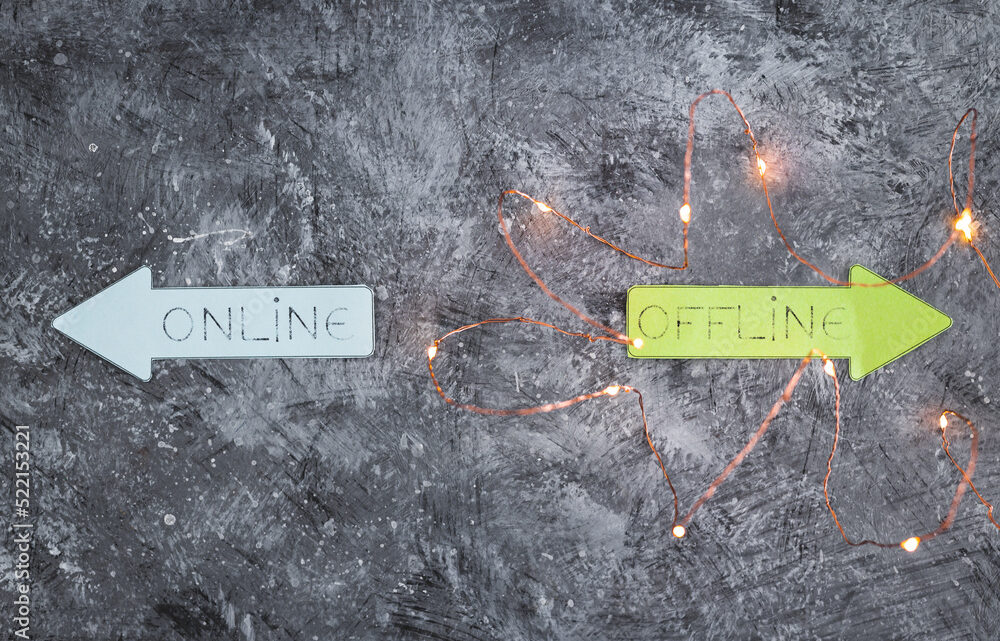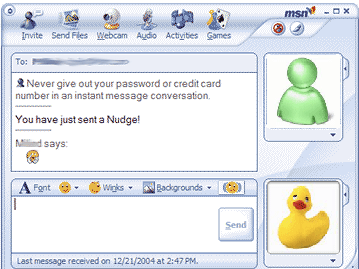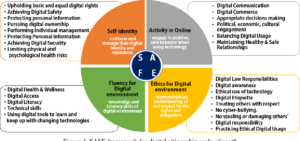
Confessions of a Former Social Media Oversharer
Like many a Xennial, reflecting on the transformation of my digital identity makes me cringe. My carefree childhood and awkward teen years are relegated to dusty photo albums, shoddy VHS home movies, and a Hotmail account with a questionable – but thankfully anonymous – username. In my early 20s, my husband asked me out on the connected but finite MSN Messenger. Shortly after that, “The Facebook” became the main source of communication…and I quickly entered my oversharing era.

MSN Messenger: The Good Ol’ Days of Limited Contact
Humbl(ing) Beginnings
In Jacquie’s selected reading, author Angela Gui (2015) ponders:
“What does it mean to be ‘me’ in the contemporary age—where do I begin, and where do I end?”
To reflect on my past digital identity (and humble myself), I need only turn to the dreaded Facebook memories section. When I joined Facebook 16 years ago (my first foray into social media), where did I believe my digital identity began? In those early days, I can remember thinking I had to “friend” every person I had ever known. I added my best friend’s ex-boyfriend’s friends. I added some girl I momentarily befriended in a pub bathroom. Seriously. And for what? To have a high friend count..because somehow that meant my newfound digital identity was “popular.” In my social media infancy, there was little thought about curating who I wanted to know me in this digital form and zero regard for an “end” or limit to my digital persona.
Likewise, there was a total lack of concern for what I shared. No one cared about my ten daily updates, including the riveting news that “Kim went to the grocery store at 1 p.m. today” or “Kim doesn’t want to get out of bed because it’s -40.” Of course, that didn’t stop my oversharing rampage. Looking at some of these memories as I write this, I wonder what image I was trying to create.

Exhibit A: Cringey Facebook Memory 2010
Digital Identity: Adventurous. Spontaneous. I am a world traveller going to exciting places with my new husband.
Reality Check: Mark and I were already living in Australia at the time. I can bet money no one cared we were going to an even warmer climate while winter was just beginning in frigid Saskatchewan. When I reflect on this time in my life (captured in this post), I can remember being newly married and worried about losing that adventurous, carefree part of myself. I needed to validate, online, that I was still my independent self.

Exhibit B: Cringey Facebook Memory 2011
Digital Identity: Fun, dedicated teacher who teaches at a fun school where we do fun things like dance old-timey fun dances.
Reality Check: No one cared if I was sick, but I can remember feeling guilty for missing this day because my Grade 9s were really excited about it. I wasn’t friends with any of my students online (by this time my digital identity had thankfully become more private and aware), but I wanted my co-workers to know I regretted being absent. Again, I needed to validate, online, that I was responsible, dedicated, and fun.
In our EC&I 832 breakout room, centered on Gui’s article, we discussed transhumanism and whether or not these online personas truly embody and/or elevate the self. Does my decades-old “Top Ten Things You Should Know About Kim” list (circa 2008) immortalize me or enhance my identity? Was I actually the digital identity I so freely shared? In some ways, these online memories offer a snapshot of who I was, or – at least – who I wanted to be. More than anything though, they reveal to me a digital immaturity in need of evolution.

GIF Credit: https://makeagif.com/ The Lawnmower Man: Transhumanism at its finest!
Private Present
Looking back, I cannot recall when the maturation of my digital identity occurred, but it did, fortunately, occur. With time, my social media platform presence grew (Instagram, TikTok, Snapchat), but my friend list shrank. Goodbye, best friend’s ex-boyfriend’s friends. Farewell, sweet girl from the pub. My digital identity no longer had to be popular. High school was a looong time ago; what did popular mean anyway?
When I had students joke to me about what a cute dog I had – and I realized (with horror) they had seen my online video about my toy poodle – I quickly learned about digital privacy. I told myself it came across as much more mysterious if no one knew when I was going grocery shopping anyway.
When my children were born, I learned about sharenting…and occasionally indulged myself. Then, with a newfound awareness and fear of online predators, my online contacts were further culled to immediate family and close friends. Still, every time I post about my children – even to my small contact list of 20 – I realize I am curating their digital identities to some extent. Consent, physically and digitally, has already become a buzzword in our home.
Sometimes the pendulum swings so far one way that it has nowhere to go but the furthest possible opposite direction. Sometimes, overwhelmed but disengaged, my digital identity has become obsolete. After working online for two and half years, I could no longer stand the sight of a screen, let alone my image on one. Accounts deleted. Deactivated. I spent six months on a digital detox. It was wonderful.
Shortly after I returned online, it was something mentioned in my EC&I 830 class that grounded my present digital identity. Someone else would shape my identity for me if I wasn’t writing my online narrative. With that in mind, I began to rewrite my story. These educational blog posts have been an excellent foray into exploring the snippets of my educational journey. Like many English majors, I express myself by writing opinion articles and poetry online. I post on Instagram (stories that are gone in 24 hours) to a limited assortment of people. I think before I post. I reflect on why I post. My digital identity is not all there is to me, but it is a part of me – no better or worse than reality. I try to be the digital citizen – polite, honest, aware – that I want and strive to be in the “real world.”
A Digital Future
While my digital evolution might make me cringe, it also allows me to empathize with my students, striving so hard to find their place in the world. Their missteps online are nothing I haven’t experienced, and yet they have to navigate more invasive digital realms than anything I ever encountered.
Reflecting on RoxAnne’s discussion about Indigeneity and the article, A rose by any other name is mihkokwaniy, I realize, too, how little marginalized demographics of students are allowed to write their truths online. How frequently misinformation and disinformation, mythmaking and gatekeeping, skew these evolving stories. Likewise, whose stories are left untold or uncentered online?
If I think about what my digital identity future holds, it is the hope that I help my children and students positively and expertly write their online narratives.
“Students today live in an interconnected world. Social media, online communities and virtual interactions permeate every aspect of modern life. Membership in this digital world requires an understanding of a new form of citizenship, and with that comes the importance of teaching digital citizenship for students.” – Brittany Simmons, EVERFI
A positive digital identity is synonymous with digital citizenship. I want my actions to show my children and students that our digital identities should reflect the values of responsible, empathetic, and critically aware digital citizenship. An online code of conduct is just as important as it is in the everyday world. As I tell my students, it’s what we do when no one else is watching that defines who we are.
Of course, these goals – both current and future – are easier said than done. To help shape my students’ digital identities, I use some of the following resources:
- MediaSmarts: Canada’s Centre for Digital Media Literacy
- Common Sense Education
- EVERFI
- CIVIX Media Literacy
- Youth Activism Project (tools and resources for youth interested in social activism, including guidance on using social media effectively to advance social justice causes)

First published in J. Educ. Technol. Soc. 2018
Final Thoughts
Reflecting on the transformation of my digital identity has been painful and rewarding. If this chronic oversharer can mend her ways, I have hope for the next generation. Their identities, like ours, will change and evolve. Many will find their voice online. Some will find community. We know, too, that many will stumble and fall. As educators, all we can do is hand them the tools to help them write their own shifting narratives.
POINTS TO PONDER
Please feel free to answer any of the following, or discuss anything else that came to mind.
- How has your own digital identity evolved over the years? Can you remember the key factors or events that influenced this evolution?
- As an educator, how do you teach digital citizenship to your students? What resources or strategies have you found work best in shaping their understanding of responsible and empathetic online behaviour?
- How can educators help students from marginalized communities navigate their digital realities while amplifying their voices and experiences?
Hi Kimberly,
I laughed as I read your post because it is eerily similar to mine 😂 I too am an oversharer and it has been 6 days since my last post.
In my role as an administrator I don’t have a home room of students anymore to teach on a daily basis when it comes to digital citizenship but I do believe I can Stuart encouraging and facilitating discussions with staff around our strategic plan and incorporating this topic into it.
Ha! It sounds like we need a social media self help group. Hi, my name is Kim and it’s been 3 hours since my last post. It sounds like you have a solid handle on these topics as an admin – helping staff strategically incorporate these lessons is so important. From an educator point of view, I would definitely value the admin input. Thanks for stopping in.
Hi Kimberley, I am a big fan of the last question you shared regarding how we can amplify the digital identity of more marginalized groups. I think that’s a fantastic thing to be working towards. I think with a rise in online activism you definitely see that already happening. As educators, I think we can utilize the tools of representation. If we model that sort of representation it can make things much more comfortable for our marginalized students. Showing positive examples of these marginalized digital identities can demonstrate their importance to our students.
Hi Cole,
Yes – you are so right. We need to show this representation and examples for all students, but particularly marginalized ones, as much as possible. That’s why I like using the Youth Activism Project. Lots of great ideas. Thanks for sharing.
This is a great post. The concept of “digital immaturity” made me think, what if we explored the idea of “digital development” like stages of Erikson’s Stages of Development? What if we shift the focus of digital citizenship into “digital identity development?”
Thanks, Michael. That’s sounds like a great idea…because students are now mentally, physically, emotionally…and digitally….developing online. That is why I have a problem with online shaming and certain forms of “cancel culture.” Kids mess up – this has always been true – but now it’s often online with the potential for the world to see. Rather than shame them (which will only frighten them away), what if online blunders were used as teachable moments? Because that’s exactly what they are.
Hi Kimberley,
Great post. Your last question makes me thinking how to encourage marginalized communities to amplify their voices and experiences. Indigenous perspectives, languages and knowledge have long been marginalized. Women and girls, ethnic minorities and low-income groups have also been severely neglected. Marginalized groups continue to be excluded for social, economic, cultural and political reasons. This forms a big digital divide for marginalized communities. Living on the disadvantaged end of the digital divide has many consequences for these marginalized groups. In this context, we should actively advocate for greater access to digital technologies for children and young people, and support them to use digital technologies to solve problems that affect their daily lives.
Hi Echo,
Thank you for the thoughtful response. You are so right. We can never stop advocating as teachers. These students must have the same access and abilities to become healthy digital citizens and be able to see/create accurate representation online. I wish the government understood this – funding wise – but regardless, we will persist.
Had some good chuckles reading this post! Every once in a while a friend will share with me a post I left on their Facebook page that comes up as a “memory”. They are so obscure and illusive.. like “You’re wearing the wrong shoes..” with no context whatsoever. It honestly should be studied how hilarious we were at navigating the intended usage of Facebook posts, lol!
My early digital identity was very similar to your own. I friended everyone I possibly could simply to drive up the number. However, where we differ is that for some reason I didn’t diversify my social media presence. For some reason (laziness? disenfranchisement? apathy?) I never branched out onto other platforms like Twitter (I refuse to call it “X”) or Instagram. I think at the time I was aging out of social media as well as concentrating on a different part of my professional life. Part of me is glad that I accidently missed out on these avenues as I already spend a disproportionate amount of time being influenced by other people’s “highlight reels”. I think that the backlash to social media is a reflection of the natural aging process. I for sure wasn’t one of the people bragging about disconnecting in the mid 2000s, but I certainly find myself shouting atop hypocrisy mountain now (without any sense of self-awareness or irony).
Hi Matt,
You are not alone – it will never be called X but I will also never join it (even pre-Musk era). Highlight reels can be their own problem – which begs the question of how authentic our digital personas really are. I think about how often I’ve posted a so-called beautiful family picture when the reality is two minutes before the snap I was yelling at my son to make a “proper” happy face. Our online identities are part of us, but they rarely convey the nuanced complexity of who we truly are. I think I am okay with that now – as long as I acknowledge it to be true. My highlight reel is not all there is to me and no one else’s is either. The problem happens when we don’t realize it. You go ahead and stay atop the disconnected digital mountain – there are much less worthy hills to die on. 🙂